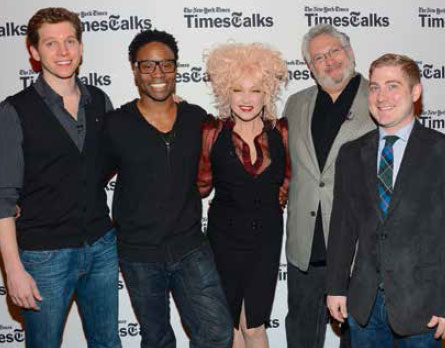
Brian Usifer (far right) was among the members of the Kinky Boots cast and creative team during a March 18 New York Times “Times Talks” public talk/interview. He was joined by (from left) lead actors Stark Sands and Billy Porter, composer and lyricist Cyndi Lauper, and book writer Harvey Fierstein. (Photo by Jamie McCarthy/Getty Images).
Brian Usifer has found himself among some of Broadway’s biggest stars, contributing to the success of its hottest new musical. As Music Director of the smash hit Kinky Boots – winner of six Tony awards in June – it’s the latest accomplishment for this 32-year-old member of the Class of 2003, whose career got a “head start,” courtesy of another Fredonian whom he met when he was just 4 years old.
As a child in New York’s Hudson Valley region, Usifer began taking piano lessons from Fredonia alumna Heather Hallenback, ’81. During their sessions, this inspiring teacher would tell him of her experiences at Fredonia’s School of Music, and of one professor in particular: Robert Jordan. It planted a seed that steadily grew within Brian, especially when he had the chance to perform for Jordan during a master class as
a young teen.
So when it came time to choose a college, Brian’s mind was made up.
“What I liked about Fredonia, and what ultimately shaped my career, is that there was such a wide range of music happening,” he says. “I was able to do what I liked to do best: play everything!”
That approach helped him get everything he could out of his college experience. Of course, he spent hours a day in Mason Hall working on his classical repertoire, but he did much more. He played with the Fredonia Jazz Ensemble (FJE) his freshman and sophomore year, and was voted director his junior and senior years. He also played with rock bands and small jazz combos, and spent many nights in the recording studio.
“Leading a band is what I do every day now, and that experience was priceless,” he attests.
After graduating, he moved to New York City, where he followed a similar lifestyle, dabbling in everything he could. He played in rock bands, jazz bands and big bands. He taught, and earned a master’s degree at New York University. He worked in regional theatre, and “subbed” in pit orchestras for Broadway and off-Broadway shows. He became a musical jack-of-all-trades.
“Ever since I’ve been playing music, I’ve always been so focused, willing to say ‘yes,’ more than ‘no,’” he explains. “I’ve always been willing to work long hours and take on multiple projects, because I believed it would lead me to success.”
Then, something odd happened to Brian. This man, who had seemingly mapped out his whole life since childhood, suddenly felt a little lost. As much as he enjoyed classical music and Broadway standards, in order to refine his career, he discovered his do-everything approach might be keeping him from distinguishing himself in the field.
“I had done regional theatre…West Side Story, Guys and Dolls…pieces that existed already. I realized that I couldn’t fit myself into that world, because I’m a writer as well, and there was a part of me that was being left behind.”
That’s when he realized his true calling was in new musicals–and he hasn’t looked back. His decision led him to play in the pit bands/orchestras for some of the top Broadway and off-Broadway shows of the past decade, including Sister Act, Wicked and Avenue Q. It also led him to the acquaintance, three years ago, of Stephen Oremus, the arranger/orchestrator whose career includes co-producing the Broadway version of 9 to 5 with country music legend Dolly Parton. Oremus invited Usifer to be Music Assistant for a new project that would ultimately become The Book of Mormon, the brain child of “South Park” creators Matt Stone and Trey Parker.
“The job was a modest position in the music department, but to be able to get into the room and work with those kinds of people, I was willing to do it,” Brian says. “Luckily, it became what it became, and I was able to get promoted (to Associate Music Supervisor).”
What it became, like most everything the irreverent Stone and Parker touch, was an overnight success. The satire which lampoons organized religion and traditional musical theatre earned nine Tony awards, including Best Musical, as well as a Grammy for Best Musical Theater Album. In fact, it became the highest-charting Broadway cast album in over four decades, reaching No. 3 on the Billboard charts.
“Working with them was incredible because they’re not only geniuses, they’re also really nice guys,” Usifer recalls. “Coming into the theatre world for the first time, they were as respectful as they could be. We also got to go out to ‘South Park’ studios in Los Angeles to do some casting and see them produce an episode.”
As amazing as that experience was, Brian is now in the midst of something possibly even bigger. Kinky Boots was nominated for 13 Tony awards this year, earning six, including Best Musical. Its creative team includes entertainment mogul Harvey Fierstein and the incomparable Cyndi Lauper, who continues to reinvent herself from her days as a 1980s pop icon. Lauper wrote the score for the blockbuster production – the first she has ever written – and quickly became the first female to win a Tony for Best Score.
For the most part, Usifer is well past any star-struck feelings he might have originally had. “From the very first day, it was very casual,” he insists. “To be in that room, you have to put it all aside.”
Usifer marvels at what a comfortable environment Lauper, in particular, fosters for the cast and crew.
“She is really so humble, and what she ended up writing was so incredible, beautiful and smart,” he explains. “She knows everybody’s name, and you kind of forget she is who she is. But then you go outside, and you’re quickly reminded by the paparazzi…”
Still, every now and again he takes a moment to appreciate the special career he has achieved just 10 years after earning his undergraduate degree in Music Performance.
“My birthday was last Sunday, and I got a text from Cyndi. That was pretty cool,” he admits. “I’ve been very lucky and blessed to have been part of not one but two of these amazing new productions,” he adds. “I mean, 75 percent of new musicals don’t make it.”
As Music Director, Brian’s job includes running the music department, teaching music to the cast, working with the director and the creator, rehearsing with the band, and conducting the show every night while also playing keyboards. “It’s one of those behind-the-scenes jobs that have a lot of responsibilities,” Brian explains, “but the show is as good as it is, in part, because we all work as hard as we do.” That work was well recognized in June, as the Kinky Boots team also took home the Tony awards for Best Orchestration and Best Sound.
So what’s it like to lead the band every night at the No. 1 musical on Broadway?
“It’s crazy. The lines outside the theatre are huge. It’s like being at a rock concert,” Brian says. “I’m physically very close to the audience when we perform, and you actually feel the applause. It’s like a wave.”
As he reflects on his college days, he’s a bit surprised at how much he is still influenced by what he learned at Fredonia. He thinks of people like Jordan and Dr. Linda Phillips, FJE’s advisor, often. “I was very close with the faculty and think of them fondly,” he says. “Dr. Phillips was so helpful, and Mr. Jordan really changed the way that I thought about music. His aesthetics were so in line with what I liked. He was a tough disciplinarian, which was what I needed.”
The now-retired Jordan is very pleased to see the success Brian has achieved, although he isn’t exactly surprised.
“Brian is a fine pianist and outstanding musician, rich in imagination and at home in a variety of styles and genres,” Jordan said. “From the beginning, he was an outstanding student, having been trained in his early years by Heather – herself a fine pianist. Brian flourished at Fredonia, winning the Concerto Competition and earning the Performer’s Certificate, the highest performance honor given at Fredonia.”
“I am very happy to hear that he (Brian) has been so successful but I must say that I am not surprised. He has the drive and talent to be successful in whatever he undertakes,” added Dr. Phillips.
Brian also values the experiences that supplemented his performance instruction, such as his nights in the sound recording studio, and the business side of the music world he was introduced to by Professor Armand Petri. In fact, it’s this area that Brian believes is most important for today’s aspiring musicians.
“My advice to today’s students is that you have to be business minded,” he says, stressing that young professionals need to discover what will financially support them. “You also have to figure out what you want to say as an artist, and then just do it. In education, there’s so much of ‘you have to do this and play that,’ but in today’s world, you have to be much more diverse. If you have a unique voice, focus on that instead of trying to fit into a mold.”
He also remembers the important role that scholarships played for him at Fredonia, a favor he has already begun to return.
“I was helped out by scholarships, and I remember my middle class family being very appreciative of that,” Brian says of his decision to make contributions to the Fredonia College Foundation. “I’m earning this money in part because of going to Fredonia, and I’m happy to give some of it right back, especially if it helps out a student who couldn’t go there otherwise.”
He’s particularly excited about the new College of Visual and Performing Arts, which will allow even more cross-disciplinary instruction for students.
“I think it’s so great,” says Brian, who made sure he got involved in the Hillman Opera and various theatre productions at Fredonia. “My master’s is in Collaborative Piano, so I believe that collaboration is such a high form of art. It’s often not taken as seriously as it should. You can study voice or piano, but to teach it in a way that a student sees how it all works together – that’s really invaluable, because that’s how the real world works.”
And while Brian’s world might not seem all that “real” to the average student, it’s certainly a fantastic goal to set.



